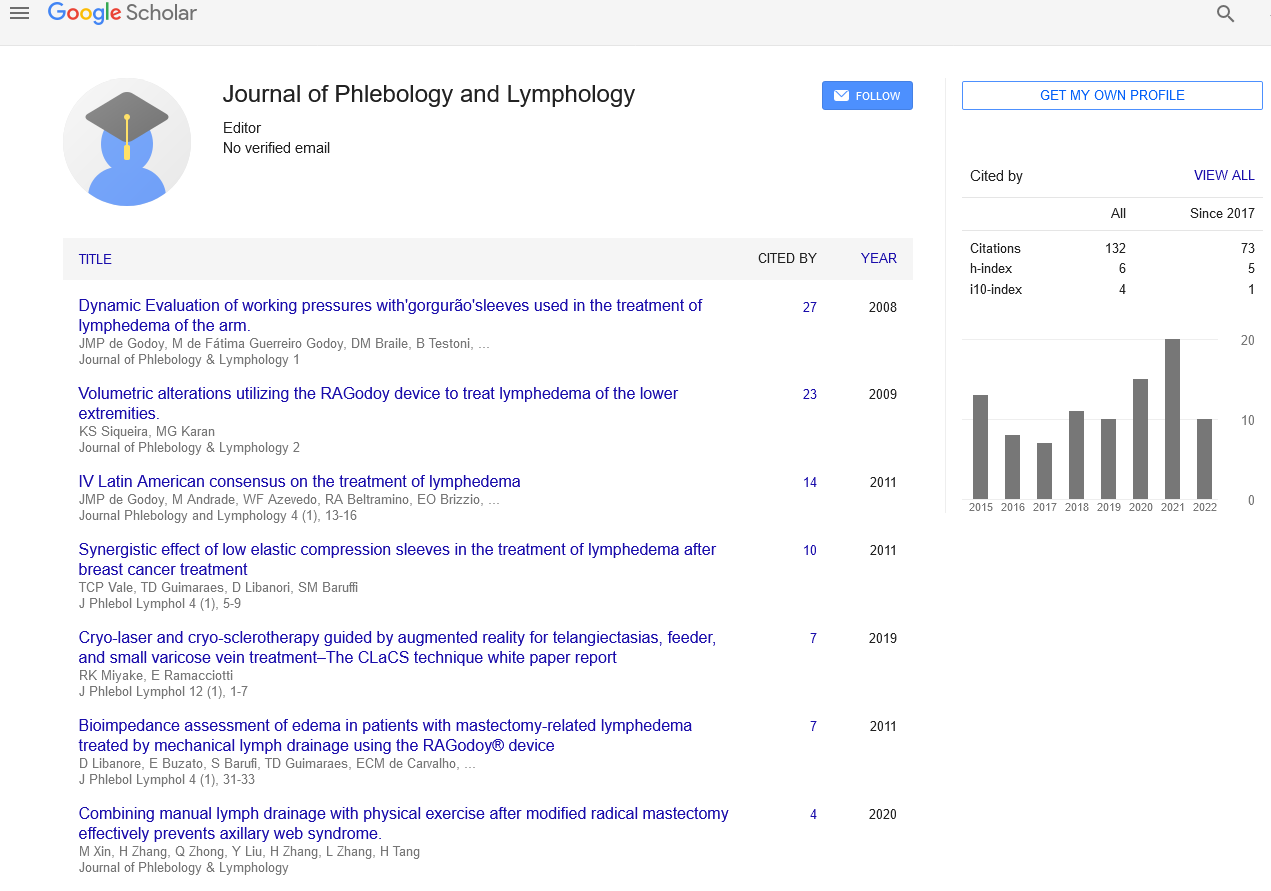The role of lymphatic system in immunity and disease
Received: 05-Sep-2023, Manuscript No. puljpl-23-6815; Editor assigned: 06-Sep-2023, Pre QC No. puljpl-23-6815 (PQ); Accepted Date: Sep 27, 2023; Reviewed: 23-Sep-2023 QC No. puljpl-23-6815 (Q); Revised: 26-Sep-2023, Manuscript No. puljpl-23-6815 (R); Published: 29-Sep-2023
Citation: Hemingway E. The role of lymphatic system in immunity and disease . J Phlebol Lymphology. 2023; 16(3):01-02.
This open-access article is distributed under the terms of the Creative Commons Attribution Non-Commercial License (CC BY-NC) (http://creativecommons.org/licenses/by-nc/4.0/), which permits reuse, distribution and reproduction of the article, provided that the original work is properly cited and the reuse is restricted to noncommercial purposes. For commercial reuse, contact reprints@pulsus.com
Abstract
The lymphatic system plays a crucial role in maintaining the body's immune response and overall health. This research article delves into the functions and components of the lymphatic system, discussing its vital role in immunity and its implications in various diseases. Understanding the mechanisms by which the lymphatic system
operates is essential for developing targeted therapeutic approaches and enhancing overall health outcomes.
Key Words
Lymphatic system; Immunity; Lymphocytes; Lymph nodes
Introduction
The lymphatic system is a complex network of vessels, nodes, and organs that work in unison to support the body's immune function and maintain fluid balance. It plays a pivotal role in protecting the body from infections, pathogens, and other foreign substances. The system is comprised of lymphatic vessels, lymph nodes, tonsils, spleen, and the thymus gland. Lymphatic vessels are distributed throughout the body, parallel to blood vessels, forming an intricate network that transports lymph, a colorless fluid rich in white blood cells called lymphocytes. Lymphocytes are key components of the immune system, primarily responsible for mounting an immune response against invading pathogens. This article aims to elucidate the significance of the lymphatic system in immunity and its involvement in various diseases, highlighting its vital role in maintaining overall health.
The lymphatic system serves multiple essential functions in the human body. Firstly, it acts as a drainage system, collecting excess tissue fluid and proteins from the interstitial spaces and returning them to the bloodstream. This process helps maintain tissue fluid balance and prevents edema. Moreover, the lymphatic system aids in lipid absorption, particularly dietary fats, from the digestive tract into the bloodstream. The lacteals, specialized lymphatic vessels in the intestines, facilitate the absorption and transportation of fats and fat-soluble vitamins. Secondly, the lymphatic system plays a crucial role in immune surveillance and defense. Lymphocytes, a type of white blood cell, are generated and stored in lymphoid organs such as the thymus, spleen, and lymph nodes. These lymphocytes constantly circulate through the lymphatic system, monitoring the body for any signs of infection or abnormal cell growth. When an antigen, such as a pathogen, is detected, the lymphocytes initiate a targeted immune response to eliminate the threat.
The primary components of the immune system housed within the lymphatic system are the T cells, B cells, and natural killer cells (NK cells). T cells mature in the thymus and play a central role in cell-mediated immunity, directly attacking infected or abnormal cells. B cells, on the other hand, mature in the bone marrow and are crucial for humoral immunity, producing antibodies that neutralize pathogens. Lymph nodes are vital structures in the lymphatic system, acting as hubs where lymphocytes interact, proliferate, and develop immune responses. These nodes filter and trap foreign particles, allowing lymphocytes to recognize and combat invading pathogens Dysfunctions or abnormalities in the lymphatic system can have profound implications for immunity and overall health. Lymphedema is a condition characterized by the accumulation of lymphatic fluid, resulting in swelling and discomfort, often observed in limbs. This condition can stem from congenital malformations of the lymphatic system or secondary to surgical procedures, infections, or trauma. Furthermore, the lymphatic system's role in disease extends to cancer metastasis. Cancer cells can spread to distant sites via the lymphatic vessels, leading to the formation of secondary tumors in lymph nodes and other organs. Understanding these disease mechanisms can inform therapeutic strategies and potentially lead to the development of targeted treatments to mitigate disease progression and improve outcomes.
Conclusion
The lymphatic system is a crucial component of the immune system, playing a vital role in immunity and disease prevention. It serves as a drainage system, maintaining fluid balance and aiding in lipid absorption. Lymphocytes, central to the immune response, are produced, stored, and circulated through the lymphatic system, providing essential defense mechanisms against pathogens. Dysfunctions in the lymphatic system can have significant implications for health, leading to conditions like lymphedema and facilitating cancer metastasis. Understanding the functions and dynamics of the lymphatic system is essential for developing targeted therapeutic interventions and enhancing overall health outcomes. Further research in this field is imperative to unlock the full potential of the lymphatic system in health and disease.





